- Home
- Christie Golden
Spirit Walk, Book One Page 6
Spirit Walk, Book One Read online
Page 6
She knew that all of her former crew had had an…interesting time trying to adjust to “regular” life here in the Alpha Quadrant after seven years of journeying, but she wondered if anyone—with the exceptions of Icheb and Seven of Nine—had had to make a more convoluted leap than she. It was quite a change, going from captain of a lost starship to a desk job here at Starfleet Headquarters. She had always thought that if such a situation ever came to pass, she’d feel like a bird with clipped wings, but to her surprise Janeway wasn’t sure she wasn’t enjoying it.
Janeway was a natural teacher, and she loved every minute of the class she and Tuvok were teaching. The young minds seated behind the desks were like sponges, soaking up everything she said. It didn’t hurt that the two old friends were teaching a fascinating subject—the Borg. Just yesterday the students had been treated to a question-and-answer session with Icheb and Seven, who had graciously volunteered to subject themselves to scrutiny. It had been a marvelous class. Janeway thought that more had been done in those two hours to dispel prejudice against Borg victims than had been done in the last fifteen years, and she was very proud of both of her former honorary crew members.
In fact, she had a few moments before her next scheduled appointment. Glancing at the chronometer, she realized that the think tank would be on its break. One of its members, a Mnari, had to sleep every three hours for at least ten minutes at a stretch or its powerful brain would suffer damage. It also, according to Seven, had to eat every two hours, so there was a constant supply of food available to what the Doctor had taken to calling the “Tankers.” “Hence,” he had lamented, “the ready availability of ammunition for the recent food fight.”
“Computer, contact Seven of Nine.”
Seven’s lovely face appeared on the viewscreen. She smiled. “Admiral. How nice to see you. How may I be of assistance?”
“Just checking in to see how you were doing after your inquisition yesterday.”
Seven arched a brow. “It was hardly an inquisition. Your students were perspicacious and attentive. It was a pleasure imparting information to them.”
“Still, they went at you pretty intensely. I was hoping that you didn’t have any negative reactions afterward.”
“Admiral Janeway,” said Seven bluntly, “I have endured more severe interrogation at the hands of Starfleet officials. I regenerated without incident.”
“Good. How are things going? You and I didn’t get much of a chance to talk yesterday.”
“Quite well, except,” she looked around and said softly, “I am concerned about the Doctor.”
“Really? Why?”
“He is putting a great deal of hope into his presentation. Too much, I think. He will be speaking to a group of individuals who are entrenched in their own opinions, and his speech, no matter how eloquent or logical, is unlikely to sway them.”
Janeway felt a stab of sympathy. Oliver Baines, though a champion of holographic rights, had really been no friend to holograms; he had done more harm than good. No one was feeling particularly sympathetic toward the issue now. It was a bad time for the Doctor to be speaking.
“Well, he’s a big hologram, he can take whatever they dish out.” She smiled at Seven. “You’ve got a good heart, Seven.”
“The heart is not the seat of emotions as poets would have us believe, Admiral. It is merely an organ whose sole function is to circulate blood throughout the body. Any kindness or sympathy I feel for the Doctor originates in the brain, particularly in the—”
“Now you’re teasing me, Seven.”
She smiled. “Yes, I confess I am.”
How far she’s come, Janeway thought. “Regardless of where the emotions originate, I’m glad you’re there to support him.”
“As am I.”
A shrill whoot-whoot-whoot sound made both women wince. “Ah,” said Seven, “Jish is awake. I need to return to duty, Admiral. Was there anything else?”
“Not a thing. Just a hello. Take care of yourself, Seven.”
“I will, Admiral. Seven out.”
Janeway sat back in her chair and stretched, gathering strength for the next conversation. She thought it would not go quite so well.
While molding young minds was definitely an important task, so was the one that lay before Janeway today—convincing a planet to stay in the Federation. She closed the door to her office, glanced at the chronometer, and said, “Computer, put me through to Amar Kol.”
After a second, Amar Merin Kol’s pleasant face appeared on the screen. The Kerovians were humanoid, with pale orange skin and red hair, four fingers on each hand, and wide mouths. They had been part of the Federation for nearly forty years. While they did not contribute anything in the way of martial assistance—no Kerovian had yet even expressed an interest in attending the Academy—they were a people who had added greatly to the Federation’s accumulated knowledge and had a keen interest in the arts. Janeway knew it would be a loss to the Federation on more than one level, should Kerovi opt to withdraw.
Janeway smiled, and Kol smiled in return. Janeway, at least, had enjoyed talking with the female leader of the planet, and it seemed as though Kol had enjoyed interacting with her as well. If only they were discussing Kerovian symphonies and theater instead of secession.
“Good evening, Admiral Janeway,” said Kol in her soft, deep voice. “Or, perhaps, it should be ‘good morning’ in San Francisco?”
“Bright and early,” Janeway replied. “I’m sorry to keep you up so late.”
“Not at all,” Kol said. “It’s always a pleasure to talk to you.”
With a twinge of regret, Janeway suspected this was quite true. It was a sentiment she shared.
“Likewise, Amar Kol,” she replied sincerely. Kol had always used Janeway’s title, so Janeway was careful to use hers. “Have you had a chance to review the statistics I sent a few days ago?”
Kol nodded. “They are very impressive, and I am delighted to hear that so much healing has already been accomplished.” She stretched her wide mouth in a sad smile as she continued, “But both you and I know that statistics can be interpreted to say whatever one wants them to say.”
Soft, but stubborn. That was Merin Kol, the proverbial iron fist in a velvet glove. The leader of the Kerovians was slender, with delicate features, and she always wore flowing, fine garments. Janeway had to wonder if the choice was deliberate, if Kol was well aware of how soft a demeanor she presented while remaining strong and resolute. It would be easy to underestimate Kol if one didn’t know her well. Inwardly, Janeway sighed.
“Kerovi has always stood firm on its policy of nonviolence,” Janeway said, “and the Federation has always respected that. You know well that we have never forced your people to contribute troops, not even at the darkest times of the war.”
“No, you have not,” Kol agreed, “but one does not have to use force in order to exert pressure.”
Janeway thought about the statistics she had been reading lately: how many millions had died. Kerovi had a population of two billion, and they had not sent a single person to fight. They had not contributed weapons or vessels or even supplies for the war. The one thing they had done was contribute assistance when it came to helping the victims of the war, willingly providing food, medicines, clothing, and shelter, and for that the Federation was grateful. Still, Janeway couldn’t help but feel a twinge of anger.
She resisted the temptation to rise to the subtle bait and continued, “Be that as it may, it still stands that Kerovi didn’t suffer a single casualty in the war, and yet it and its people were protected by the Federation.”
Kol’s gaze was steady. “Protected from attack in a war we did not want,” she said. “Kerovi’s government—and I personally, Admiral—wanted no part of the Dominion War. We spoke against it. We would not have required such protection from the Federation had not the Federation turned every single planet that belonged to it into a potential target for its enemies.”
Her voice was growing h
arsher, and Janeway changed the subject.
“We’ve discussed this before, Amar. And we’ve agreed to disagree. It’s a moot point. The fact remains, we won this war, and the planets in the Federation are safe because of that fact.”
Kol arched a red eyebrow.
“If there were to be trouble again,” Janeway continued, pressing her point, “from a neighbor or another direction, Kerovi would be able to call upon the Federation for assistance. If you secede from it, you would be left completely vulnerable. Your planet has no real way of defending itself.”
“Until we joined the Federation, for several thousand years, Kerovi had no need to defend itself. To us, it’s cause and effect. Join the Federation, and your planet subsequently requires protection.”
“Join the Federation,” Janeway said, keeping her voice calm and even, “and your planet has access to medical and scientific advances as they are discovered and proved safe. Your planet has food if there is a shortfall, technologies to help your people prosper. You’re able to participate in shaping the future of the quadrant.”
“Admiral,” said Kol in a voice of aching sincerity, “I fear for the future of this quadrant, if the last few years have been any indication of where it’s going.”
She threw up her slender, four-fingered hands in exasperation. “All the things you say are true, but what you’re not saying is that the Federation doesn’t have a stranglehold on free trade—at least,” she amended, “not yet.”
Janeway’s eyes narrowed. It took effort, but she held her tongue.
“We can obtain food and technologies and medicine through other means. Means that don’t force us to ally with a huge, anonymous collection of planets. Means that don’t put Kerovi at risk.”
Janeway smiled sadly, the anger bleeding out of her. “Why do I feel dizzy?”
Kol smiled too, her pretty face softening. “As if you’ve been running around in circles? How odd, for I feel the same way.”
Janeway hesitated. “You’ve put forth some passionate arguments, Amar Kol. But you still haven’t committed to formally withdrawing. I take it that you will be at the conference?”
Kol nodded. “Yes, I will. I look forward to meeting you in person, Admiral. I think there are many things we would agree about.”
“I think so, too. I had best let you get some sleep, Amar.”
Kol made a wry face. “Sleep is in short supply for an amar,” she said.
“And for admirals,” Janeway replied. “Good night, Amar.”
When Janeway’s face disappeared from the screen, Kol sighed. This was so difficult. Janeway was such a commanding, persuasive presence it was hard to say no to her, even when Kol knew it was the right thing—and the thing both her people and her government wanted.
She rubbed her cheeks, massaging the sensitive cluster of nerves there. It helped her relax.
Amar Merin Kol had come into power by accident six years ago. Her husband had been killed in an accident and she had stepped up out of a sense of duty to serve out his term. She was not prepared to be reelected, and while she strove to uphold her honorable position by studying, learning, and listening, she was glad that she had so many wise people around her to advise her.
Her computer chimed softly, and she realized it was one of those self-same wise people. Smiling, she touched the screen and the familiar face of her friend and adviser, Sul Alamys, appeared.
“Good evening, Amar,” Alamys said. “I trust I am not disturbing you?”
“Of course not,” Kol said. “My best adviser could never be a disturbance. How has your trip been progressing? What have you learned?”
“A great deal,” said Alamys solemnly, “all of which supports our position. Amar, as I predicted, we are not alone in resenting the bullying of the Federation. Of the six representatives I’ve talked with, three are also considering secession.”
“Really?”
The number was startling. Kol had not realized that so many others were discontented. It would seem, she thought sadly, that the Dominion War continued to produce casualties.
Alamys nodded. “There is a disproportionate number of certain species in the Federation, and they are the ones who seem to control it. Humans, Vulcans, Trill, Bolians, and a handful of others compared to the hundreds of species that are represented. We have only a few officials to represent our interests. We are helpless to control what the Federation does, yet must go along with it.”
Kol nodded sadly. “Forty years is a long time,” she said. “It will be difficult to withdraw.”
“And had things continued as they were for the last forty years,” Alamys said, “I would not advise withdrawing. But the Federation’s policy is tantamount to meddling now, and that meddling led to many deaths. They don’t have to be Kerovian deaths for Kerovi to mourn their loss.”
“No, of course not,” agreed Kol. “If only the Federation had been more isolationist. Certainly there are enough challenges among its member planets that it didn’t need to go to war and create more.”
“And that,” said Alamys, “is the position of nearly all the planets who are considering withdrawal.”
Kol nodded and sighed. “Continue your conversations with these people, Alamys, and keep me apprised,” she said. “I will take your observations with me to the conference.”
And, she thought sadly, be the bearer of bad news to Admiral Janeway in person.
Chapter
7
ENSIGN DAVID CHITTENDEN SETTLED down in Voyager’s mess hall with his lunch. Everyone’s assignment was new, of course, as this was the ship’s first mission since its return to the Alpha Quadrant. But this was Chittenden’s first assignment on a starship, and he was more than a bit nervous.
He took a bite of his ham sandwich and chewed thoughtfully, his blue eyes darting around to see who else was present. He decided to play a game with himself, to see if he could tell who was one of the original Voyagers and who, like him, was an Alpha Quadrant veteran.
Some of them he knew by sight—Lieutenant Harry Kim, and of course Lieutenant Vorik, who was his superior officer. Their connection with the ship was well-known. But that cute young woman over there, with the short red hair and the freckles on her nose—she had to be AQV, right out of the Academy. She was too young to have served for seven years. And the fellow over there, tall and rangy, about his own age—he kept glancing around as if he didn’t feel comfortable here.
“This seat taken?” came a pleasant female voice.
Chittenden was so startled he spilled his coffee. “Sorry, I didn’t hear you. Please, sit down,” he said. Blushing, he leaped up to wipe a puddle of coffee off the seat he had just indicated.
“Thanks.” The young woman smiled at him as she sat down. When he’d finished cleaning up the spill, she stuck out her hand.
“I’m Lyssa Campbell,” she said.
He shook the proffered hand, recognizing the name as that of the ship’s ops officer.
“David Chittenden,” he said, a little in awe.
“Oh, you’re the whiz kid everyone’s talking about,” she said in a pleased tone of voice, lifting a slice of pizza to her lips.
David felt himself blushing. “Whiz kid?” He sat up a little straighter.
Campbell nodded, chewing on her pizza. She wiped her mouth with her napkin.
“Oh, you bet,” she said. “Vorik’s mentioned your name to me at least twice. And believe me, from him, that’s a real compliment. Welcome aboard Voyager.”
“Thanks,” he murmured, returning his attention to his sandwich. A long pause ensued. Chittenden tried desperately to think of a topic of conversation.
“Um…how does it feel to be back?”
“On Voyager?” She considered it. “Good, I think. But a little strange. Seven years is a long time to be with the same crew.” She gave him a slow smile. “It’s nice to have some new blood.”
He was definitely blushing now. “I suppose it would be,” he said, rather inanely, he thought. Searc
hing for something to say, he added, “Voyager’s a real Starfleet ship now.”
The attractive smile faded and the blue eyes were suddenly chilly. David realized he had inserted his foot in his mouth somehow.
“We were a Starfleet ship every minute that we were in the Delta Quadrant,” she said, her voice still pleasant but with a hint of warning in it.
Oh, God, Chittenden thought desperately. Let me say the right thing.
“Of course you were,” he said quickly. “What I meant was, now those who were in the Delta Quadrant can be on the team again.”
Her expression grew even colder. David winced inwardly. Sports metaphors. Bad idea, Dave. Bad idea.
“We got lost in the Delta Quadrant because Captain Janeway was completing a mission on the orders of Starfleet Command,” Campbell said. There was no mistaking her ire now. “Because we were on that mission, we got kidnapped by the Caretaker. Or haven’t you read up on your history?”
“Um,” said Chittenden.
“We were snatched away from everything we knew and deposited seventy thousand light-years from home. We lost a lot of good people, right at that moment and over the next seven years. But Captain Janeway got us home. A bit of a miracle, if you ask me. And we’re here, and we’re more than ready to serve. But we were never not on the team, Ensign. Never.”
Chittenden replied, “Well, you certainly weren’t playing in the Alpha Quadrant. We lost a lot of good people here too, you know. A few million good people.”
The color rose in her face. She looked even more attractive.
“And how many of those millions of good people did you know and love? I lost friends I’d seen every single day for seven years!”
“I lost friends too, Lieutenant!” Their faces swam into his mind, the pain of their deaths eased only a very little by the ultimate victory over the Dominion. “Friends who willingly boarded ships and headed into battle to fight for the protection of this quadrant, not to just get home and have a nice cup of coffee!”

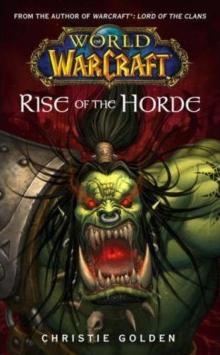 Rise of the Horde
Rise of the Horde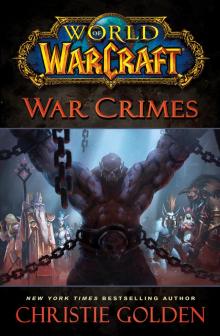 World of Warcraft: War Crimes
World of Warcraft: War Crimes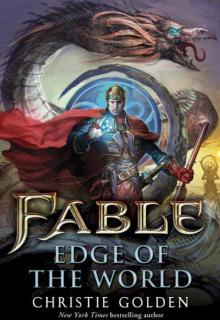 Fable: Edge of the World
Fable: Edge of the World Homecoming
Homecoming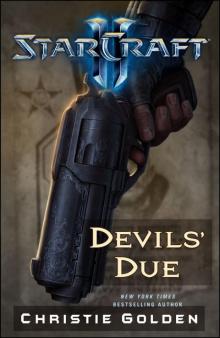 StarCraft II: Devil's Due
StarCraft II: Devil's Due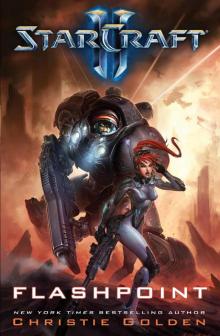 Starcraft II: Flashpoint
Starcraft II: Flashpoint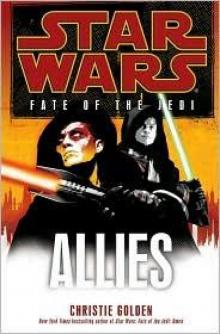 Allies
Allies Shadow Hunters
Shadow Hunters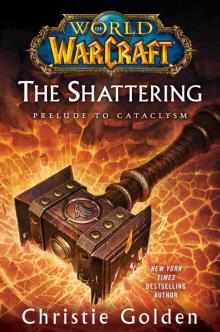 The Shattering: Prelude to Cataclysm wowct-1
The Shattering: Prelude to Cataclysm wowct-1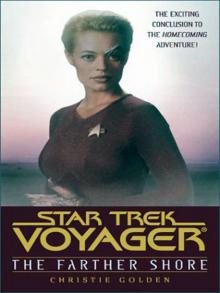 STAR TREK: VOY - Homecoming, Book Two - The Farther Shore
STAR TREK: VOY - Homecoming, Book Two - The Farther Shore King's Man and Thief
King's Man and Thief In Stone's Clasp
In Stone's Clasp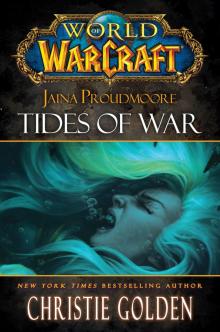 Jaina Proudmoore: Tides of War
Jaina Proudmoore: Tides of War Vampire of the Mists
Vampire of the Mists Star Wars: Fate of the Jedi II: Omen
Star Wars: Fate of the Jedi II: Omen King's man and thief cov-2
King's man and thief cov-2 Star Trek
Star Trek StarCraft: Dark Templar: Twilight
StarCraft: Dark Templar: Twilight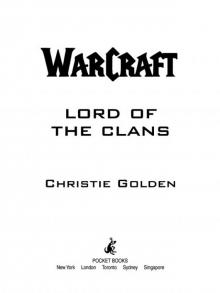 Lord Of The Clans
Lord Of The Clans ARKTIKA.1 (Short Story)
ARKTIKA.1 (Short Story)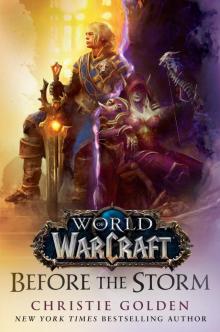 Before the Storm
Before the Storm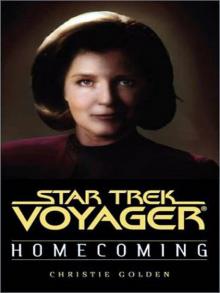 STAR TREK: VOY - Homecoming, Book One
STAR TREK: VOY - Homecoming, Book One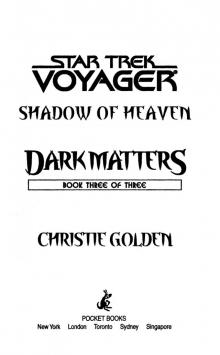 Shadow of Heaven
Shadow of Heaven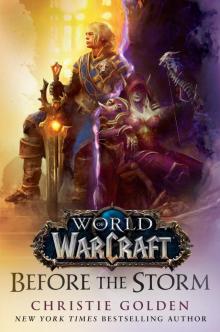 Before the Storm (World of Warcraft)
Before the Storm (World of Warcraft)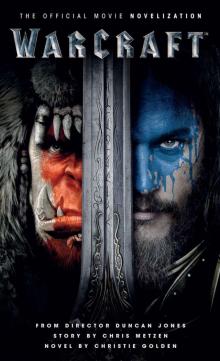 Warcraft Official Movie Novelization
Warcraft Official Movie Novelization Flashpoint
Flashpoint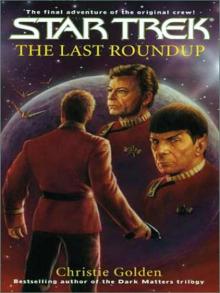 STAR TREK: The Original Series - The Last Roundup
STAR TREK: The Original Series - The Last Roundup On Fire’s Wings
On Fire’s Wings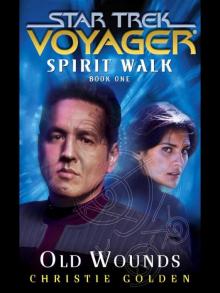 Spirit Walk, Book One
Spirit Walk, Book One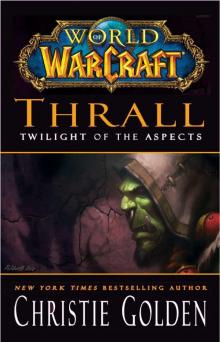 Thrall Twilight of the Aspects
Thrall Twilight of the Aspects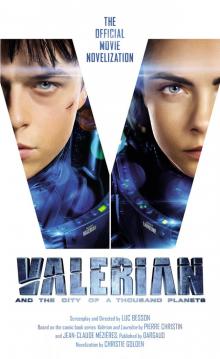 Valerian and the City of a Thousand Planets
Valerian and the City of a Thousand Planets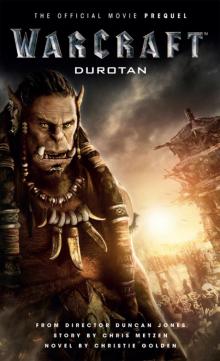 Warcraft
Warcraft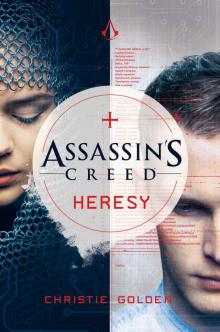 Assassin's Creed: Heresy
Assassin's Creed: Heresy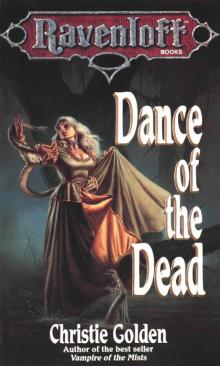 Dance of the Dead
Dance of the Dead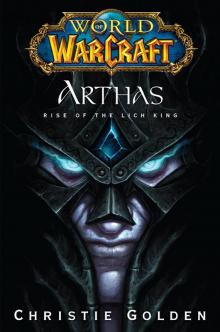 Arthas: Rise of the Lich King wow-6
Arthas: Rise of the Lich King wow-6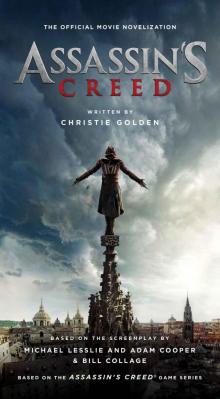 Assassin's Creed: The Official Movie Novelization
Assassin's Creed: The Official Movie Novelization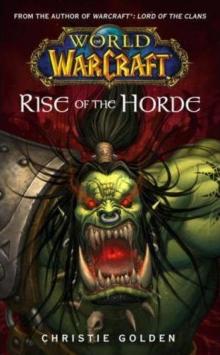 Rise of the Horde wow-2
Rise of the Horde wow-2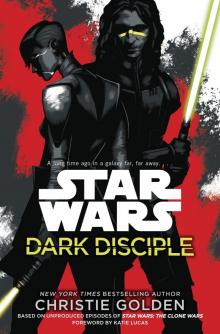 Dark Disciple
Dark Disciple Ghost Dance
Ghost Dance The Shattering
The Shattering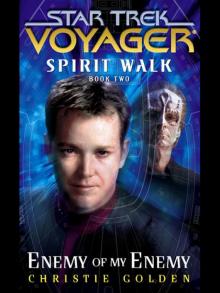 Spirit Walk, Book Two
Spirit Walk, Book Two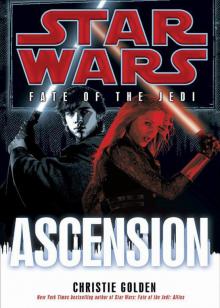 Star Wars: Fate of the Jedi: Ascension
Star Wars: Fate of the Jedi: Ascension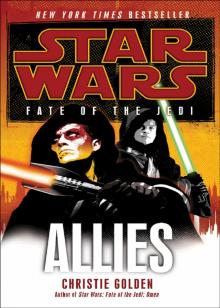 Star Wars: Fate of the Jedi V: Allies
Star Wars: Fate of the Jedi V: Allies The Enemy Within
The Enemy Within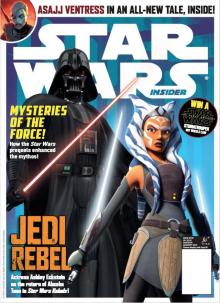 Kindred Spirits
Kindred Spirits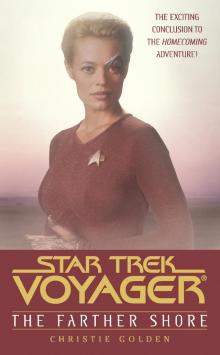 The Farther Shore
The Farther Shore Star Trek: Hard Crash (Star Trek: Starfleet Corps of Engineers Book 3)
Star Trek: Hard Crash (Star Trek: Starfleet Corps of Engineers Book 3) Twilight
Twilight